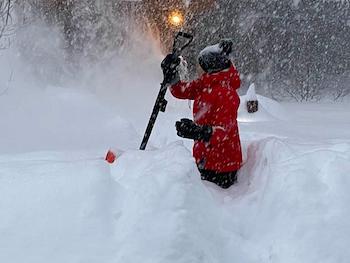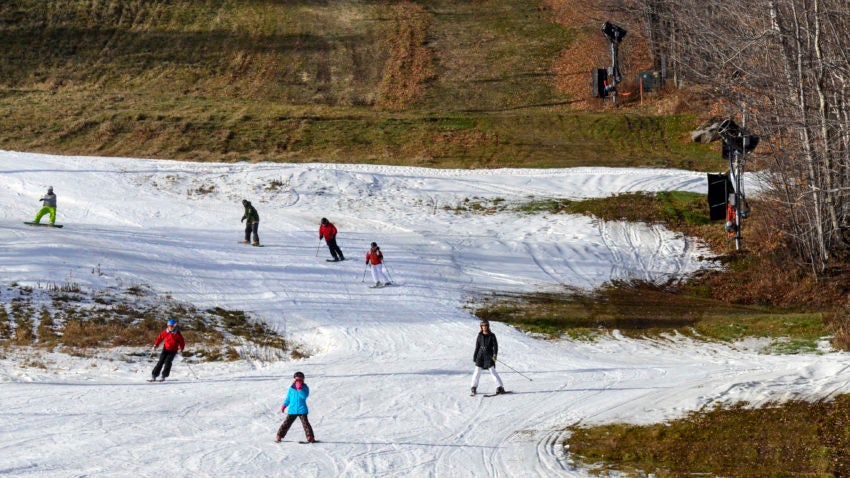How often do you check the weather before you go skiing? Once a day? Twice, three times? Yeah, me, too. Weather is a huge preoccupation with skiers because skiing is so, well, weather-dependent. So knowing where to go for weather forecasts is a big deal to us. It’s something that we all think about. A lot.
But even though it’s a science, weather forecasting is tricky. Sure, you have a lot of data, augmented by satellite images, radar, and more. But weather forecasting requires much more, because it’s also an art. A lot hinges on how the scientific data is interpreted. And not everyone interprets the data the same way.
Which brings up the topic of weather models. Basically, weather models are simulations of the future state of the atmosphere over time. Forecasters use these to figure out what’s going to happen in the days ahead. There are a number of models to choose from, each using different data and ways of gathering and interpreting that data. Some models do better in certain weather situations but poorly in others, while others do better in certain geographic regions and poorly in others (even with the same type of weather event). So the human element — the expertise and experience of the meteorologist — is extremely important. For example, when I interviewed Joel Kratz of Open Snow, a weather forecasting service, in 2019, he said this: “The thing that makes snow forecasting challenging in big mountains is that the computer forecast models do not handle the mountains very well. So it takes some local knowledge, based on past experience, to know when certain storm setups will favor certain areas.” (For the complete interview, go here. It’s actually very interesting.) The best forecasters consult different weather models and use their own experience and skills to project what’s going to happen.

44″ of snow on December 17
Still, things can go crazy. Here’s a good example: a few weeks ago, my little area of Vermont was forecast to get 4-6 inches of snow — if we were lucky. That’s what most of the forecasts said. Instead, we ended up with 44 inches (yes, you read that right), something more akin to a place like Mammoth or Tahoe.
Which brings me back to what I said before: Weather forecasting is tricky.
So who do the Ski Divas rely on for weather predictions? As you can imagine, there are a variety of different sources. Here area a few:
National weather sources
National Weather Service: This is the granddaddy of them all, and the one a lot of people and forecasters rely on. An agency of the US federal government, the NWS churns out numerous forecasts daily. In addition to short- and medium-range forecasts, you’ll find precipitation forecasts, historical data, radar, and every kind of weather map you can imagine,
Weather.com: Also known as The Weather Channel, this is a commercial forecasting service geared toward consumers. It’s easy to use and has plenty of information.
Accuweather.com: Accuweather has been around since 1962, and has a wealth of information for weather nuts. AccuWeather uses 176 models, including models from Japan and China, in addition to the European model and NWS’s. It uses both governmental weather data and information from private companies’ sensors
WeatherUnderground.com: This is the one I seem to turn to the most.
If you’re interested in determining which site has the best forecasting accuracy for your specific area, you might want to check out ForecastAdvisor.com. Put in your zip code, and it’ll show you the accuracy of the major weather forecasters, including Accuweather, The Weather Channel, WeatherBug, Weather Underground, CustomWeather, Foreca, and the National Weather Service. It’ll also provide links to your city’s weather forecast at all the other weather forecasters, so you can compare for yourself.
Specifically for skiers.
There are a number of weather resources geared specifically for skiers. Here are a few that the Ski Divas use:
Snow-forecast.com: Snow-Forecast provides snow forecasts, weather maps, and snow reports for 3,200 ski resorts. Sign up for a paid membership and receive customized snow alerts and forecasts.
Opensnow.com: OpenSnow is geared towards skiers and boarders. The site provides data for mountain summits instead of nearby towns, current snowfall measurements, snow stake cameras, and lots more. Opensnow has a very nice free app that you can customize for the mountains you ski the most.
Onthesnow.com: Onthesnow has been around a long time — more than 50 years — and provides snow conditions, weather, and guides to 2,200 ski resorts worldwide. Yes, there’s a free app with a lot of great information for skiers, too.
MountainWeather.com: Located in Jackson Hole, Mountainweather.com presents weather not only for Jackson Hole and the Tetons, but for mountain locations around the world.
Northeast Skiology: Instead of a website or an app, Northeast Skiology is a Facebook group that’s both a blog and a group. As its name indicates, it’s geared toward forecasting weather and providing condition reports throughout the Northeast. Skiology is run by Matthew Bramble, an avid snowboarder and self-professed weather nerd. People who join the group can contribute their own on-the-snow observations..
Dave Hayes The Weather Nut: Another Facebook page, Hayes features weather info for western Massachusetts, as well as southern Vermont, southwestern NH, the Taconics of eastern NY, northern CT, and central Massachusetts. Dave is a weather nut who started his page in 2011.
Seth’s Weather Report: And yes, this makes the third resource located on Facebook. It’s run by avid skier and weather junkie, Seth Linden, who works for the National Center on Atmospheric Research. It focuses on weather for Denver/Boulder, the adjacent foothills and mountains, and most of the north-central mountains in and around Summit County.
Wasatch Snow Info: Snow info specific to the Wasatch Range in Utah.
PowderPoobah.com: PP is run by meteorologist Larry Schick, who spent more than 20 years presenting the weather on Seattle TV. He focuses on the Cascades and offers interesting articles on a variety of weather-related topics.
MammothWeather.com: A great source for weather in the Eastern Sierra, MammothWeather is run by Howard Specter, a 40 year resident of Mammoth Lakes. Howard has amassed detailed records of local conditions and experience and uses it to provide local weather forecasts.
SkiTheEast.com: Ski The East features weekly weather videos done by Tim Kelley, avid skier and meteorologist from New England Cable News. This isn’t a daily forecast, but the videos are very entertaining and informative.
Any you’d care to add?


